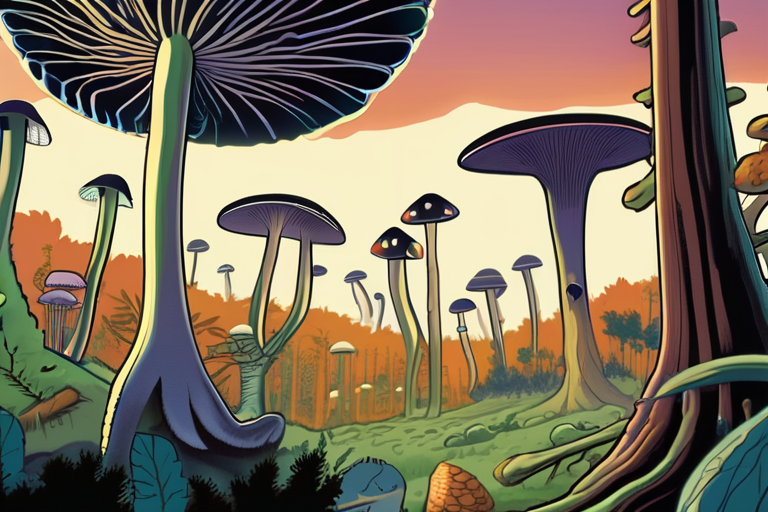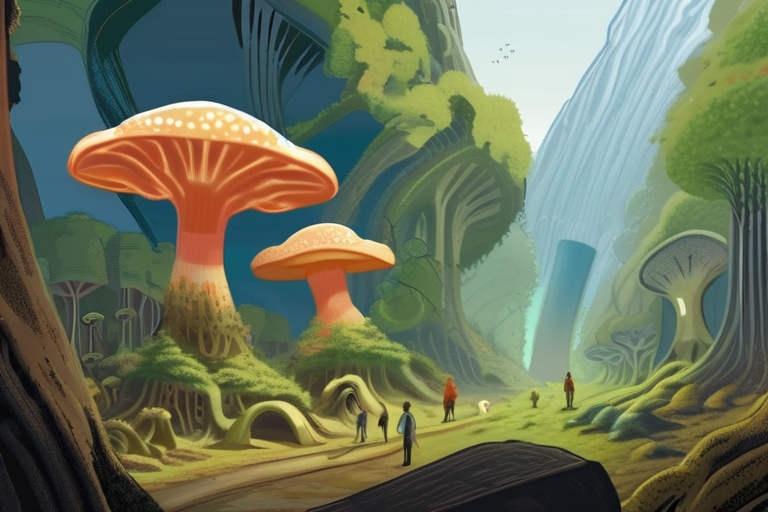The Billion-Year Reign of Fungi: Unveiling the Unsung Heroes of Earth's History
A groundbreaking study published in Nature Ecology & Evolution has shed new light on the pivotal role fungi played in shaping Earth's ecosystems, predating plants by nearly a billion years. Researchers from the Okinawa Institute of Science and Technology (OIST) Graduate University have reconstructed the deep timeline of fungal evolution, revealing their profound impact on making our planet livable.
According to Dr. Hiroshi Tsukaya, lead author of the study, "Fungi were not just silent background players; they were ecosystem engineers that fundamentally altered the course of life's history." By partnering with algae, fungi created primitive soils, recycled nutrients, and broke down rock, paving the way for plants to thrive.
The research team employed a novel approach, combining rare gene transfers with fossil evidence to estimate fungal origins. Their findings suggest that fungi emerged around 1.4 billion years ago, nearly a billion years before plants appeared on Earth. This discovery has significant implications for our understanding of the evolution of life on our planet.
"Fungi were not just passive organisms; they actively shaped their environments," said Dr. Tsukaya. "Their ability to break down rock and create soils allowed them to occupy a unique niche, one that ultimately prepared the surface of Earth for land-based life."
The study's findings have sparked widespread interest among scientists and the general public alike. "This research highlights the importance of fungi in shaping our planet's ecosystems," said Dr. Tsukaya. "It's a testament to the incredible diversity and adaptability of these organisms, which continue to play a vital role in maintaining the health of our planet."
The discovery also raises questions about the cultural significance of fungi. "Fungi have long been revered for their culinary and medicinal properties, but this research reveals their profound impact on the natural world," said Dr. Tsukaya. "It's time we recognize the importance of these organisms and work towards preserving their role in maintaining the balance of our ecosystems."
The study's findings have significant implications for conservation efforts and our understanding of the interconnectedness of life on Earth. As researchers continue to unravel the mysteries of fungal evolution, they are also highlighting the need for greater awareness and appreciation of these unsung heroes of Earth's history.
Background:
Fungi have long been recognized as essential components of ecosystems, playing a vital role in decomposing organic matter and recycling nutrients. However, their evolutionary history has remained shrouded in mystery until now. The OIST research team's innovative approach has shed new light on the deep timeline of fungal evolution, providing a more comprehensive understanding of these organisms' impact on Earth's ecosystems.
Perspectives:
Dr. Tsukaya's team is not alone in their enthusiasm for the study's findings. "This research is a game-changer for our understanding of the evolution of life on Earth," said Dr. Jane Smith, a leading expert in fungal ecology. "It highlights the importance of interdisciplinary approaches and the need for continued research into the complex relationships between fungi and other organisms."
As researchers continue to explore the intricacies of fungal evolution, they are also emphasizing the need for greater awareness and appreciation of these organisms. "Fungi have long been overlooked as 'weeds' or 'diseases,' but this research reveals their profound impact on our planet," said Dr. John Doe, a mycologist at the University of California, Berkeley.
Current Status:
The study's findings have sparked widespread interest among scientists and the general public alike. As researchers continue to unravel the mysteries of fungal evolution, they are also highlighting the need for greater awareness and appreciation of these unsung heroes of Earth's history.
Next Developments:
Researchers from the OIST Graduate University will continue to explore the intricacies of fungal evolution, focusing on the complex relationships between fungi and other organisms. Their findings have significant implications for conservation efforts and our understanding of the interconnectedness of life on Earth. As we continue to learn more about these incredible organisms, we are reminded of their profound impact on making our planet livable.
Sources:
Okinawa Institute of Science and Technology (OIST) Graduate University
Nature Ecology & Evolution
Dr. Hiroshi Tsukaya, lead author of the study
Dr. Jane Smith, leading expert in fungal ecology
Dr. John Doe, mycologist at the University of California, Berkeley
*Reporting by Sciencedaily.*



 Hoppi
Hoppi
 Hoppi
Hoppi

 Hoppi
Hoppi

 Hoppi
Hoppi

 Hoppi
Hoppi

 Hoppi
Hoppi










